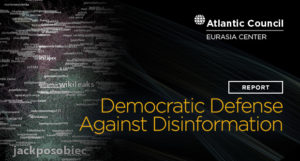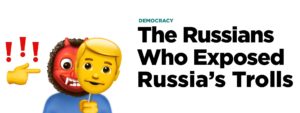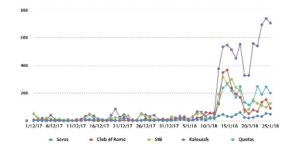
Hewlett
A major foundation will commit $10 million over the next two years toward addressing the challenges that digital disinformation poses for democracy.
Focusing primarily on the role of social media, the new funding commitment will support high-quality research to help improve decisions made by leaders in the technology sector as well as government and civil society advocates, The William and Flora Hewlett Foundation announced today. The initiative falls under the rubric of the foundation’s “Madison Initiative,” launched in 2013 to strengthen the values, norms and institutions of U.S. democracy in a polarized era.
 “Americans – from citizens to policymakers to scholars to social media executives themselves – are just beginning to understand and acknowledge how technology platforms can spread disinformation, encourage polarization and undermine civil, democratic discourse,” said Daniel Stid, director of the foundation’s Madison Initiative. “We hope that our grants will help shed light on the dark corners of the web, and lead to solutions that support a more informed democratic debate.”
“Americans – from citizens to policymakers to scholars to social media executives themselves – are just beginning to understand and acknowledge how technology platforms can spread disinformation, encourage polarization and undermine civil, democratic discourse,” said Daniel Stid, director of the foundation’s Madison Initiative. “We hope that our grants will help shed light on the dark corners of the web, and lead to solutions that support a more informed democratic debate.”
Cyber-attacks from both state and non-state actors are among the principal threats identified in the UK’s new National Security Capability Review.
“The democratization of information, and the means to exploit it, has allowed hostile actors to exert disproportionate influence in competition with the public interest,” the report states:
We continue to see long-term shifts in the balance of global economic and military power, increasing competition between states as well as the threat from non-state actors…. The communications landscape is continually evolving. Communications are increasingly being used by our partners and adversaries alike for strategic real-world advantage. Traditional channels have been largely discarded in favor of digital and social media platforms. This is combined with a decline of trust in traditional sources of information and the era of so-called ‘fake news’. In parallel, the rules of the game have changed.
It should be clear by now that the West is at war, even it’s not the kind of war we’re accustomed to, says analyst Christian Caryl. We’re now confronting the capacity of governments to reach deep into the political systems of their rivals from afar, often leveraging the power and anonymity of modern technology to sow chaos and exercise influence, he writes for the Washington Post.
 Some experts believe that the Chinese pose an even bigger threat to the West than the Russians — which doesn’t change the fact that we have to counter both, he asserts:
Some experts believe that the Chinese pose an even bigger threat to the West than the Russians — which doesn’t change the fact that we have to counter both, he asserts:
The remedies are fairly obvious. Western democracies should take decisive steps to limit Russian and Chinese economic influence over their societies and to impose transparency on government-sponsored institutions (such as the Confucius Institutes). We need to launch serious efforts to track and counter covert influence campaigns and disinformation. We need to dramatically boost our counterintelligence capabilities, which have withered since the end of the Cold War. And we clearly need to broaden our cyberdefenses, as shown by recent revelations about Russian infiltration of our critical infrastructure.
After the Cold War, many of us naïvely assumed that the communications revolution would be the vehicle through which the West would spread its values, attitudes and tastes to the rest of the world, notes New York Times columnist Bret Stephens. We forgot that the revolution worked in the opposite direction as well: that for every Google executive fighting for political liberalization in Cairo, there might also be an alienated young Islamist in the West learning how to build a bomb by reading Inspire, Al Qaeda’s slick online magazine.
 Recent Western expulsions, indictments and sanctions pale against the scope and seriousness of Russia’s hybrid warfare, analyst Robert M. Dannenberg writes for Cipher Brief:
Recent Western expulsions, indictments and sanctions pale against the scope and seriousness of Russia’s hybrid warfare, analyst Robert M. Dannenberg writes for Cipher Brief:
Putin despises Western values, is envious of the economic power that our market economies generate, and knows he cannot match the pervasive and powerful influence of the ideas the West transmits to the world through social media… His only tool to compete by undermining the West via a hybrid cyber and military threat. RTWT
Disinformation Conundrum
 Despite expectations, fake news appears to have played a relatively minor role during the recent Czech presidential elections, notes Jonas Syrovatka. But that doesn’t mean the popularity of such “alternative” sites should be ignored or the reasons why so many Czechs are willing to take the bait, he writes for Transitions Online:
Despite expectations, fake news appears to have played a relatively minor role during the recent Czech presidential elections, notes Jonas Syrovatka. But that doesn’t mean the popularity of such “alternative” sites should be ignored or the reasons why so many Czechs are willing to take the bait, he writes for Transitions Online:
My organization, the Prague Security Studies Institute, analyzed how six major Czech sites known to spread disinformation covered the presidential candidates during the two months preceding the elections. Through the course of this project – “The Czech Elections in the Era of Disinformation” – we employed an analytical tool called > versus <, which the International Republican Institute [a core institute of the National Endowment for Democracy] developed within its Beacon Project, allowing us to see if (and how much) various themes, weaponized by disinformation, spread across the internet.







